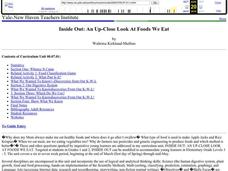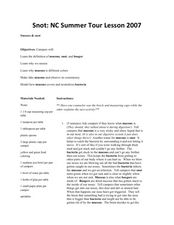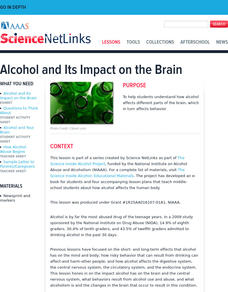Calvin Crest Outdoor School
Survival
Equip young campers with important survival knowledge with a set of engaging lessons. Teammates work together to complete three outdoor activities, which include building a shelter, starting a campfire, and finding directions in the...
Chymist
Landfills and Recycling
Examine the nature of landfills through experimentation. Scholars build miniature landfills and monitor changes over a six-week period. Observations allow individuals to draw conclusions about the different types of trash and their...
Serendip
How Do Biological Organisms Use Energy?
When an organism eats, how does food become energy? Young biologists follow glucose through the process of cellular respiration to the creation of ADP using a discussion-based activity. The resource also highlights conservation of mass...
ProCon
Vegetarianism
What do Mike Tyson, Ellen DeGeneres, and Paul McCartney have in common? They're all famous vegetarians. Using the resource, scholars learn about the pros and cons of eating a vegetarian diet. They read a fascinating history of...
Curated OER
Geometry: Practical Applications of the Distance Formula
Learners, working independently and in groups, apply the distance formula to practical situations. After solving various problems, students in pairs design coordinate planes from the school blue print to measure the distance from the...
Curated OER
Teeth And Eating
Students explore and study all about teeth and eating. They examine types of teeth, how their teeth develop, looking after teeth and teeth in other animals. Each student also reviews the process of how teeth help all mankind to eat food.
Curated OER
The Three Worm Phyla
Ninth graders examine the three worm phyla. In this classification lesson, 9th graders observe, compare and contrast the planarian, tapeworm, and fluke.
Curated OER
Nutrition 3: Got Broccoli?
Students discover why the human body needs food in order to survive. In groups, they analyze advertising for the foods they eat the most and try to identify the nutritional value of them as well. They complete a worksheet showing them...
Curated OER
Inside Out: An Up-Close Look At Foods We Eat
Fourth graders identify the origins of meats and vegetables consumed by humans on a daily basis. They classify foods (meats, dairy products, grains...) and create a food pyramid.
Curated OER
Enzyme Lab
Students examine the effects of specific enzymes on samples of liver tissue, muscle tissue (chicken), apples, and potatoes.
Curated OER
Sponges, Cnidarians, Flatworms, and Roundworms
In this simple animals worksheet, students review the characteristics of sponges, cnidarians, flatworms, and roundworms. This worksheet has 12 matching questions.
Curated OER
Embryology Word Search
In this word search worksheet, students locate 43 vocabulary words related to embryology. The word list includes insulin, appendix, and stomach.
Curated OER
Snot: NC Summer Tour Lesson 2007
Students study various aspects of mucous. In this mucous lesson, students investigate the purpose of mucous. Students create fake mucous.
Curated OER
Owl Pellet
Students discover an owl's diet. In this animal science lesson plan, students observe owl pellets, determining what the owl ate. Students put together the owl's food chain, after determining the animals in the owl's diet.
Curated OER
Blend-A-Plant Levels of Organization
Students' identify and analyze the levels of organization and the emergent properties through experimentation. Students' apply the differences in the properties of a plant before and after it has been subjected to a kitchen blender.
Curated OER
Alcohol and Its Impact on the Brain
Students examine water as it changes states. In water and ice lesson plan students study the water cycle and what happens to it as it changes state.
Curated OER
Mussel Anatomy Lesson Plan
Students identify the parts and functions of a mussel. They explain how its physical adaptations help it survive in its habitat. They label the parts as a quiz to complete the lesson.
Curated OER
9 Phyla of the Animalia Kingdom.
Students identify characteristics of all 9 phyla of the Animalia Kingdom. They create a table of the 9 phyla and research a representative organism for each.
Curated OER
Embryological Development Using Medaka Fish
Young scholars analyze and record major events that occur in the development of Medaka fish eggs from fertilization to hatching. In small group, students describe the processes involved, creating a timeline of the major events in the...
Curated OER
Cooking Lesson
Fourth graders taste different flavors on their popcorn. In this taste bud lesson, 4th graders make predictions about taste and dip popcorn into four different flavors. They record how the flavors tasted - sweet, salty, bitter, or sour.
Curated OER
Grizzly Hibernation
Students explain why and how grizzlies hibernate. They make a den using cardboard boxes. They write a story told from a new-born grizzly.
Curated OER
Nutrition 2: Good Food, Good Health
Students examine how food provides them with energy and materials for their body. In groups, they identify good and bad foods to maintain a healthy lifestyle. Using the internet, they research how food can affect their overall health.
Curated OER
Blood
In this blood learning exercise, students describe the four functions of blood. Then they write what each part of the human body illustrated does below the picture. Students also complete the table on possible blood types of a receiver...
Curated OER
Worksheet #39 Questions - Battle of Saratoga
In this Battle of Saratoga quiz worksheet, students test their knowledge through ten fill in the blank questions that relate to the aforementioned subject.

























